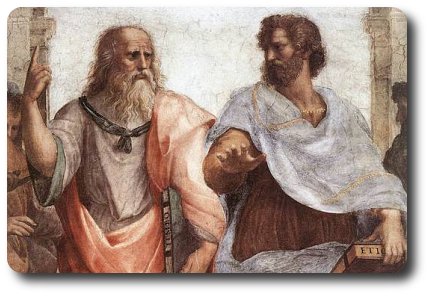The materialists hold the complete opposite view to the idealists on the nature of reality. Materialists believe that everything that exists is either matter or depends on matter for its existence. The real world is out in the street, not in the head.
Aristotle was Plato’s first great critic. Aristotle thought that Plato had got things back to front by saying the “form”, or idea, of a thing is what is most real. He said that material things are what is real and that their form is part of their reality. Aristotle said that reality is made up of a lot of different things, which is called “substances”. Any substance is a fusion of “thisness” (what is made of) and “whatness” (its form, or what it is). For example, the “thisness” of a wooden chair is the wood from which it is made. The wood is shaped, or formed, into what it is — a chair.
Aristotle also found fault with Plato’s Forms in that they did nothing to explain how things change. This led Aristotle to develop his own theory about change. He said that every substance has inherent “potentiality”. By this he meant that things have within them the potential to change. For instance, water has the [potential to become ice. It can also become steam.
 Aristotle also disagreed with Plato’s idea that the soul is separate from the body. He argued that all living things have a soul. This is what animates them and makes them different from substances like rock and water. The type of soul something possesses corresponds to what it does and what it needs. The lowest organisms, such as plants, need only to be nourished and to reproduce themselves. Animals have feelings, and so there is sensitive aspect to their souls. People are much more complicated and have many more dimensions to their souls. Aristotle believed that living things are different because their souls are made of different stuff. He also thought that souls perish when living things die. However, he identify an aspect of the human soul that might survive death. this aspect is thought or reason. Aristotle could find no physical basis for the thoughts that impose themselves on (or “in-form”) the mind.
Aristotle also disagreed with Plato’s idea that the soul is separate from the body. He argued that all living things have a soul. This is what animates them and makes them different from substances like rock and water. The type of soul something possesses corresponds to what it does and what it needs. The lowest organisms, such as plants, need only to be nourished and to reproduce themselves. Animals have feelings, and so there is sensitive aspect to their souls. People are much more complicated and have many more dimensions to their souls. Aristotle believed that living things are different because their souls are made of different stuff. He also thought that souls perish when living things die. However, he identify an aspect of the human soul that might survive death. this aspect is thought or reason. Aristotle could find no physical basis for the thoughts that impose themselves on (or “in-form”) the mind.Like Socrates. Aristotle thought people should strive to be good. He came up with a “means test” so that people could hone their virtues. He argued that real virtue lies between overdoing something and not doing it enough. For instance, being courageous is the mean average between being rash and being cowardly.
This “golden mean” is also reflected in Aristotle’s view on politics. Unlike Plato’s belief on elite philosopher-rulers, Aristotle believed that a strong middle class should be in charge, so creating a balance between tyranny and democracy.
Aristotle’s inexhaustible inquiry into the world around him led him to develop the first system of logic in Western Philosophy. He wanted to develop argument into a tool to test the truth about things. The central figure of Aristotle’s method is the “syllogism”. A simple example is this: All men are mortal. Socrates is a man. Therefore, Socrates is mortal. This shows how two indisputably true statements can be used to produce a conclusion.
Marx was very influenced by Hegel. However, he disagreed with Hegel’s view that history is the result of a developing idea. Marx thought that history is a material process. He argued that changes in the way people live lead them to develop new ideas, not the other way around.
Marx agreed with Hegel’s view that history goes through different stages. He believed that the latest stage of history, capitalism, would be overcome. Marx dreamed of a better society in which money would not rule and everything would be shared. One of his most famous texts is “The Communist Manifesto”. In this short book he argues that capitalism makes slaves of people. He called people working for money “wage slave“, who are forced to produce goods they will probably never use. 


